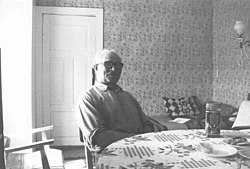Estonian Swede

Oskar Friberg was the last male Estonian Swede on the island of Vormsi who outlived the Soviet Occupation
|
|
| Regions with significant populations | |
|---|---|
|
|
26,000 |
|
|
300 |
| Languages | |
| Swedish, Estonian | |
| Religion | |
| Lutheranism | |
| Related ethnic groups | |
| Finland-Swedes, Swedes, Danes, Norwegians, Icelanders, Baltic Germans | |
The Estonian Swedes, Estonia-Swedes, or Coastal Swedes (Swedish: estlandssvenskar, "Estonia Swedes", colloquially aibofolke, "Island People", Estonian: rannarootslased, i.e. "Coastal Swedes" or eestirootslased) are a Swedish-speaking linguistic minority traditionally residing in the coastal areas and islands of what is now western and northern Estonia. The beginning of the continuous settlement of Estonian Swedes in these areas (known as Aiboland) dates back to the 13th and 14th centuries, when their Swedish-speaking ancestors arrived in Estonia from what is now Sweden and Finland. Almost all of Estonia's Swedish-speaking minority fled to Sweden during World War II, and only the descendants of a few individuals who opted to stay are permanently resident in Estonia today.
The Swedish-speaking population in Estonia persisted for about 650 years. The first written mention of the Swedish population in Estonia comes from 1294, in the laws of the town of Haapsalu. Further early mentions of Swedes in Estonia came in 1341 and 1345 (when an Estonian monastery in Padise sold "the Laoküla Estate" and Suur-Pakri Island to a group of Swedes). During the 13th through 15th centuries, large numbers of Swedes arrived in coastal Estonia from Swedish-speaking parts of Finland, which was part of the Kingdom of Sweden (and would remain so until 1809), often settling on Church-owned land. The first documented record of the island of Ruhnu (Swedish: Runö), and of its Swedish population, is also a 1341 letter sent by the Bishop of Courland which confirmed the islanders' right to reside and manage their property in accordance with Swedish law.
In 1561, Sweden established the Dominion of Swedish Estonia, which it would hold until 1710 (formally until 1721, when the territory was ceded to Russia under the Treaty of Nystad). The Estonia-Swedes prospered during this period. Swedish, along with German and Estonian, was one of the official languages.
...
Wikipedia
